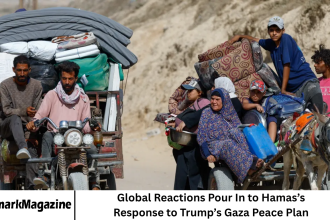In a surprising turn of events, former U.S. President Donald Trump has urged Israel to stop its ongoing bombing campaign in Gaza following what he described as a “constructive” response from Hamas to an American-brokered peace proposal. Trump’s statement, made during a press conference at his Mar-a-Lago estate.
- Trump’s Statement: A Call for Strategic Restraint
- Hamas’s Conditional Response to the Peace Proposal
- Israel’s Reaction: Defiance and Division
- International Response: A Global Push for De-escalation
- Humanitarian Crisis Deepens in Gaza
- Trump’s Re-entry into Middle East Diplomacy
- The Peace Proposal: Key Provisions and Challenges
- Immediate Ceasefire (30 Days):
- Prisoner Exchange and Humanitarian Aid:
- Long-Term Political Settlement:
- Domestic and Regional Political Implications
- Can Trump’s Words Make a Difference?
- The Path Ahead: Fragile Hope in a Region Torn by Conflict
- Frequently Asked Question
- Conclusion
Signals a new chapter in the complex dynamics between Israel, Hamas, and the international community. His intervention—both diplomatic and rhetorical—comes amid intensifying pressure for an end to the violence that has ravaged Gaza and drawn widespread condemnation around the world.
Trump, who has maintained close ties with Israel’s leadership since his presidency, notably changed his tone by calling for a temporary cessation of hostilities. He urged Israel to “pause the bombings” to allow space for “genuine peace negotiations.” His remarks follow Hamas’s formal response to a peace framework reportedly presented by the United States,
More Read:Report: California Partnership Boosted COVID-19 Response, Health Equity
Trump’s Statement: A Call for Strategic Restraint
In his statement, Trump emphasized that “lasting peace cannot be achieved through endless retaliation.” He praised Hamas’s engagement with the peace proposal as “a small but meaningful step,” while cautioning both sides against further escalation. “Israel has every right to defend itself, but now is the time for smart leadership,” Trump said. “Bombs won’t build peace—dialogue will.”
This tone marks a notable shift from Trump’s earlier positions. During his presidency, he was one of Israel’s staunchest supporters, recognized Jerusalem as its capital, and facilitated the Abraham Accords, which normalized relations between Israel and several Arab states.
However, his recent remarks reflect a more pragmatic, diplomatic approach that prioritizes regional stability over confrontation. Sources close to Trump’s advisory circle suggest that he has been privately engaging with Middle Eastern intermediaries to position himself as a potential peace broker ahead of the 2026 U.S. elections.
His renewed focus on Middle East diplomacy might be part of a broader strategy to demonstrate statesmanship and global influence.
Hamas’s Conditional Response to the Peace Proposal
According to diplomatic officials in Cairo and Doha, Hamas delivered its written response to the U.S.-led peace framework earlier this week. The group reportedly accepted several key provisions, including a temporary ceasefire and internationally supervised reconstruction, while rejecting clauses that required it to fully disarm or recognize Israel as a state.
Hamas’s statement, issued through its political wing, called the proposal “a potential foundation for serious dialogue” but insisted on guarantees for Palestinian sovereignty, the release of prisoners, and the withdrawal of Israeli forces from occupied territories.
“We are ready to consider a long-term truce if the rights of the Palestinian people are acknowledged and protected,” said Hamas spokesperson Fawzi Barhoum. While many Western observers see Hamas’s response as tactical rather than transformative, some analysts argue that the organization’s willingness to engage at all reflects mounting internal and external pressure.
Gaza’s humanitarian crisis—exacerbated by relentless Israeli airstrikes, power shortages, and food insecurity—has left the population on the brink of collapse.
Israel’s Reaction: Defiance and Division
The Israeli government, led by Prime Minister Benjamin Netanyahu, reacted cautiously—and, at times, defiantly—to Trump’s comments and Hamas’s response. A senior Israeli official stated that Israel “will not halt operations until all terrorist capabilities in Gaza are neutralized.”
Netanyahu, under immense domestic and international scrutiny, framed the ongoing campaign as a “necessary act of self-defense.” However, not all within Israel’s political spectrum share Netanyahu’s hardline stance. Opposition figures, such as Yair Lapid and Benny Gantz, have expressed concerns about Israel’s growing isolation and the humanitarian toll of the conflict.
Former security officials have also warned that continued bombardment could undermine Israel’s strategic objectives by eroding global support and strengthening Hamas’s narrative. Israeli society itself remains polarized.
While many citizens back the government’s insistence on security, an increasing number—especially among younger generations—are calling for a diplomatic solution. Peace rallies in Tel Aviv and Haifa have drawn thousands demanding an end to the war and a renewed push for negotiations.
International Response: A Global Push for De-escalation
Trump’s remarks have injected new momentum into diplomatic efforts led by Washington, Cairo, and Doha. U.S. Secretary of State Antony Blinken has welcomed Hamas’s willingness to engage but cautioned that “words must translate into verifiable actions.” European Union leaders have echoed calls for a ceasefire, with France and Germany emphasizing the urgency of humanitarian access to Gaza.
The United Nations, meanwhile, has renewed its appeal for an immediate cessation of hostilities. UN Secretary-General António Guterres described the situation in Gaza as “beyond catastrophic,” urging both parties to “embrace the narrow window of opportunity for peace.”
Regional actors, including Turkey, Jordan, and Saudi Arabia, have also expressed conditional support for the peace framework. Analysts suggest that these countries see a diplomatic resolution as essential to preventing broader regional instability—especially after the conflict has already strained Israel’s ties with its Arab neighbors.
Humanitarian Crisis Deepens in Gaza
While diplomacy inches forward, the reality on the ground in Gaza remains dire. According to the UN Relief and Works Agency (UNRWA), more than 1.8 million Palestinians—nearly 80% of the enclave’s population—are now displaced. Hospitals are struggling to operate amid fuel shortages, and international aid convoys face obstacles at border crossings.
Medical organizations such as Doctors Without Borders have reported a collapse in basic healthcare infrastructure, with thousands injured and unable to receive treatment. Water scarcity and food shortages are intensifying daily, leading to what the World Health Organization (WHO) has described as a “public health disaster.”
Trump’s call for restraint, therefore, resonates beyond geopolitics—it directly intersects with the urgent humanitarian imperative to save lives. The U.S., along with the European Union, has pledged to increase aid delivery contingent on the implementation of a ceasefire.
Trump’s Re-entry into Middle East Diplomacy
For Trump, this intervention represents both a humanitarian gesture and a political calculation. After leaving office, he has continued to assert his role in shaping U.S. foreign policy discourse, often criticizing the Biden administration’s handling of international crises. By advocating peace in Gaza, Trump positions himself as a statesman capable of influencing outcomes beyond American borders.
Political observers note that his renewed engagement in Middle Eastern affairs could appeal to a broad range of voters—both evangelicals supportive of Israel and moderates seeking an end to endless wars. His emphasis on “smart leadership” and “negotiation over destruction”.
Reflects an attempt to reclaim the diplomatic legacy of the Abraham Accords, which he often cites as one of his major achievements. Yet, skeptics warn that Trump’s approach may oversimplify deeply entrenched geopolitical realities.
While his calls for restraint have earned praise from some quarters, critics argue that his past policies—particularly his recognition of Jerusalem as Israel’s capital—contributed to the very tensions now being negotiated.
The Peace Proposal: Key Provisions and Challenges
The U.S.-backed peace framework, jointly drafted by American, Egyptian, and Qatari diplomats, outlines a three-phase plan:
Immediate Ceasefire (30 Days):
Both sides agree to halt offensive operations. Israel would suspend airstrikes, while Hamas would cease rocket fire. Humanitarian corridors would be opened under UN supervision.
Prisoner Exchange and Humanitarian Aid:
Israel would release a set number of Palestinian detainees in exchange for hostages held by Hamas. International aid agencies would coordinate food, fuel, and medical supply distribution.
Long-Term Political Settlement:
Negotiations would focus on establishing a demilitarized Gaza under international oversight, coupled with commitments toward a two-state solution.
However, significant obstacles remain. Israel insists on Hamas’s full demilitarization—a condition Hamas rejects outright. Meanwhile, Palestinian factions remain divided between Hamas in Gaza and the Palestinian Authority in the West Bank, complicating the representation and implementation of any peace deal.
Domestic and Regional Political Implications
The developments have far-reaching political implications not only for Israel and Palestine but also for the broader Middle East. Egypt and Qatar, long mediators in the conflict, view the latest talks as a test of their diplomatic leverage. Saudi Arabia, which has paused normalization talks with Israel, is cautiously monitoring progress before reengaging.
In Israel, Netanyahu faces mounting internal pressure as protests grow against his handling of the war. His political survival may hinge on whether he can deliver security without further isolating Israel internationally.
For Hamas, participating in negotiations carries both opportunity and risk. A ceasefire could provide much-needed relief for Gaza’s civilians but might also be perceived by hardliners as a capitulation. Internally, the organization must balance pragmatism with maintaining its resistance credentials.
Can Trump’s Words Make a Difference?
Whether Trump’s intervention will have a tangible impact remains uncertain. While his global influence persists, he currently holds no official diplomatic authority. Nevertheless, his remarks have captured international attention, and some diplomats believe his message could pressure Israel to reconsider its approach.
Especially if it aligns with growing global sentiment. Political analysts argue that Trump’s ability to influence Netanyahu—rooted in their personal rapport—could prove decisive if the Israeli leader calculates that ignoring Trump might alienate future U.S. support.
The Path Ahead: Fragile Hope in a Region Torn by Conflict
Despite the cautious optimism surrounding these developments, peace in Gaza remains precarious. Every past truce between Israel and Hamas has eventually unraveled under the weight of mistrust, violence, and competing political agendas. Yet, the stakes today are higher than ever.
The devastation in Gaza, the shifting global mood, and the growing fatigue on both sides create a narrow—but real—window for change. As Trump himself said, “Peace is never easy, but it’s always possible.” His unexpected appeal to halt the bombings underscores a broader truth: lasting peace will require not just political will, but moral courage from all involved.
Frequently Asked Question
What did Donald Trump say about Israel’s actions in Gaza?
Trump urged Israel to “pause the bombings” following Hamas’s conditional acceptance of a U.S.-led peace proposal. He called for diplomacy over continued military action, emphasizing the need for strategic restraint.
What is the peace proposal Hamas responded to?
The peace plan, brokered by the U.S., Egypt, and Qatar, outlines a three-phase roadmap involving an immediate ceasefire, prisoner exchanges, humanitarian aid, and steps toward a long-term political solution.
How did Hamas respond to the peace plan?
Hamas accepted parts of the plan, including the ceasefire and reconstruction efforts, but rejected conditions requiring disarmament and formal recognition of Israel. The group emphasized Palestinian sovereignty as non-negotiable.
How has Israel reacted to Trump’s statement and the peace talks?
The Israeli government has maintained a defiant stance, insisting on the continuation of its operations until Hamas’s military capabilities are neutralized. However, internal dissent and international pressure are growing.
What is the humanitarian situation in Gaza right now?
The humanitarian crisis is dire. Over 1.8 million people are displaced, hospitals lack supplies, and essential resources like water and electricity are scarce. The UN describes the situation as “beyond catastrophic.”
Why is Trump getting involved in Middle East diplomacy again?
Trump’s involvement is seen as both a humanitarian effort and a political move to reassert his influence on global affairs ahead of a potential 2026 presidential run. His intervention echoes his past diplomatic initiatives like the Abraham Accords.
Is there real hope for peace between Israel and Hamas?
While the situation remains fragile, Hamas’s engagement and global diplomatic pressure offer a glimmer of possibility. However, deep-rooted mistrust, political divisions, and unresolved core issues still stand in the way of lasting peace.
Conclusion
Trump’s call for Israel to stop bombing Gaza after Hamas’s response to the peace plan adds a new layer to an already complex geopolitical equation. It reflects a rare convergence of humanitarian concern, political calculation, and global diplomacy. Whether this moment leads to genuine progress or simply another temporary pause in an endless cycle remains to be seen.
Still, for millions of civilians in Gaza and Israel alike, even a brief silence from the bombs would represent a much-needed glimmer of hope.







